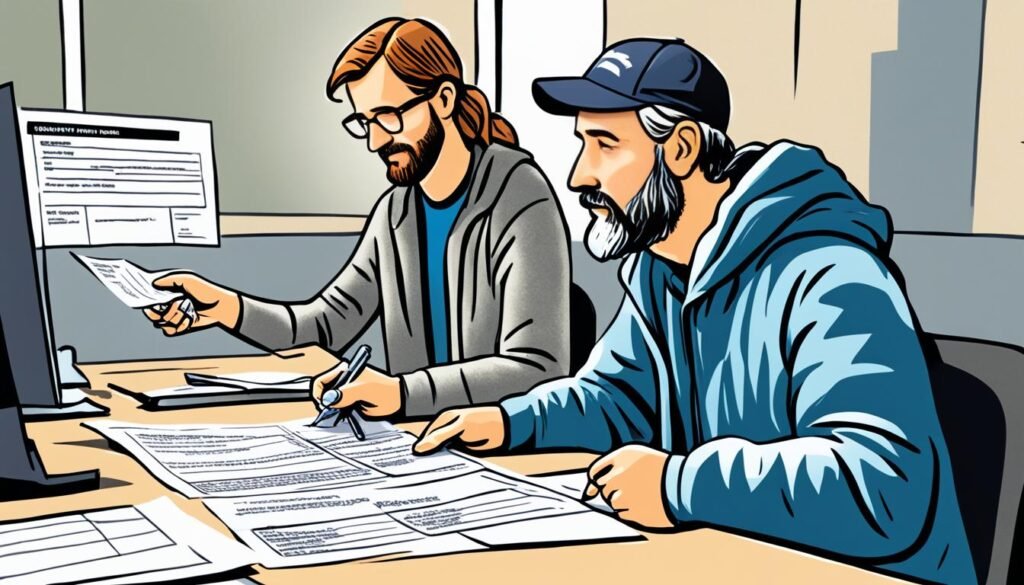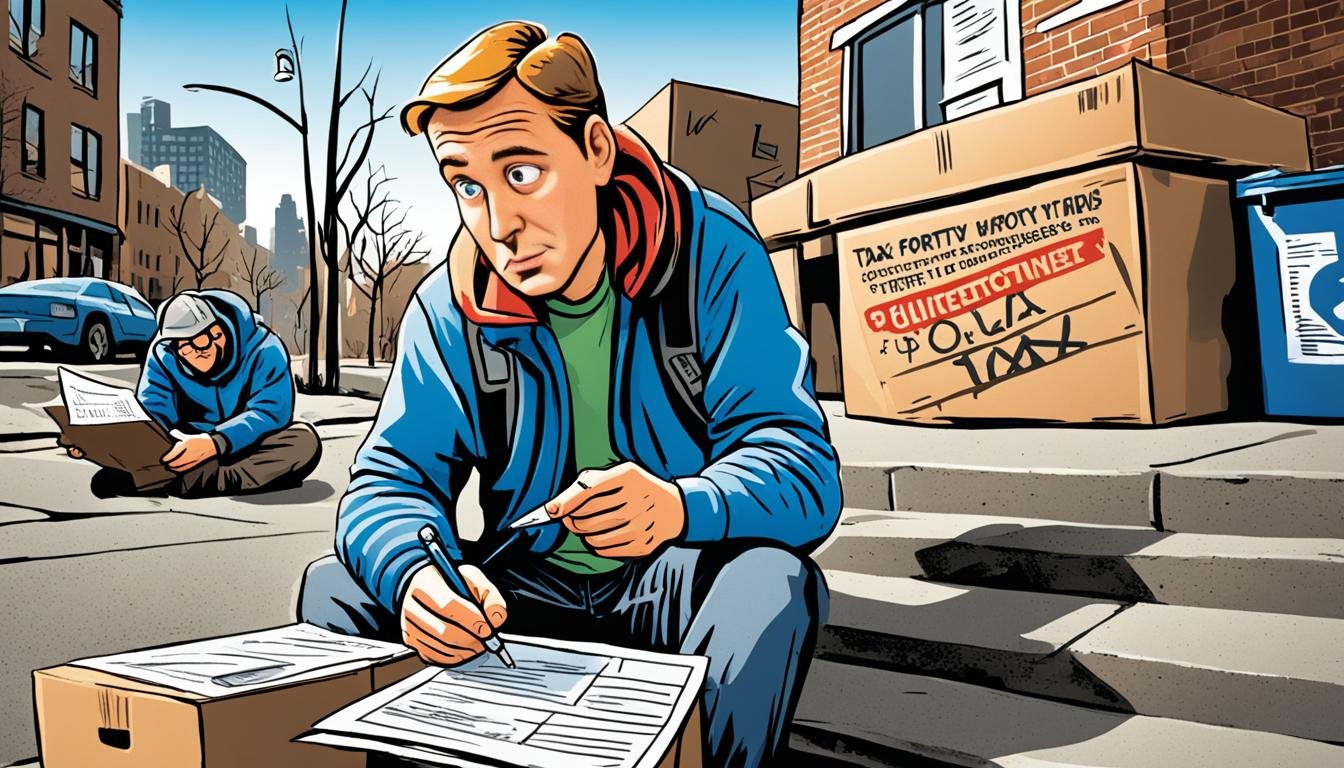One common question among those who do have housing is: Do homeless people pay taxes? The answer might just surprise you.
In short, yes, many homeless people pay taxes. In the US, income tax is solely based on income. It doesn’t matter how old you are or how you earn your money—if your income reaches a certain threshold, it is subject to taxation. Generally, prisoners and homeless individuals earn little to no income, but if they do earn enough, they are required to pay income tax.
Additionally, if they purchase goods, they must pay sales tax where applicable. Everyone is supposed to report all earnings, including gifts, though tracking and enforcing this among the homeless is significantly more challenging than for others, which is one of the many reasons why in recent years the powers that be have been pushing to build a cashless society.
As a real estate investor in rundown houses, I’ve learned a lot about homelessness. This issue affects many, yet it’s often misunderstood. People who are unhoused do, in fact, contribute to society & pay taxes, though it’s often overlooked.
Dealing with taxes is hard for homeless folks, especially without a fixed address. Some must pay federal taxes, depending on how much they earn. In 2018, over 144 million Americans, including many without homes, filed taxes. Organizations like Father Joe’s Villages help them out. They provide support with filing, let them use shelter addresses, and more.
Key Takeaways
- Homeless people face special difficulties with taxes.
- In 2018, many homeless individuals filed federal taxes.
- Groups like Father Joe’s Villages help a lot with taxes and benefits.
- Using shelter addresses is a helpful approach for the homeless to get their tax info.
- The income limit for the Earned Income Tax Credit (EITC) in 2020 is $15,820 for singles with no children.
Understanding the Concept of Taxes
Taxation is key to how we run our economy. It has a big impact on the support we can give to people in need, like those without a stable home. Knowing how taxation works is vital. It allows for the funding of public services, which help those facing tough times, like homelessness.
Definition of Taxation
When we talk about taxation, we mean the way governments collect money from citizens. This money is crucial for funding services like shelters, housing aid programs, and other basic needs. These services are key in helping people who are struggling with housing issues.
How Taxes Fund Public Services
Taxes are important for supporting the services we all use in our communities. For example, money from income taxes is supposed to help pay for healthcare, education, and support programs. People dealing with housing problems can get help from these funded programs. This includes benefits like Medicaid and the EITC, which reduce their financial stress.
Common Misconceptions About Taxes
Many people have wrong ideas about taxes, especially if they don’t have to file a return. The rules for income-based taxes have certain income limits. For instance, you might not need to file taxes if you earn less than $10,150 a year. However, there are benefits like the EITC that can still help. Knowing these details is important, especially for those facing housing issues.
Income and Employment Among the Homeless Population
Some people think the homeless don’t work. But, many of them have jobs. They work hard despite facing many hardships. Let’s learn more about their employment.
Statistics on Employment Among Homeless Individuals
In a 2002 study, the Urban Institute found that 45% of homeless adults worked in the past month. This shows almost half of them are trying to work. Their work rate is lower than the general population by 14 points, though.
Many homeless individuals work multiple jobs while living in shelters. Working is crucial for them, helping to bring in money to survive.
Types of Jobs Commonly Held by Unhoused Individuals
Homeless people typically have low-paying, unstable jobs. They often work in the hospitality, construction, retail, or food service fields. Some do day labor, freelancing, or find other informal work to make ends meet.
But, they show great strength in finding work, even in difficult living situations. Living near urban areas helps them find more job opportunities.
Challenges Faced by Homeless Workers
Homeless workers have unique challenges. Getting to work without a stable home is one. Not having a consistent place to receive work notices is another. Finding shelter that’s safe for sleep is hard, affecting their health and job consistency.
Life without permanent housing makes it hard to keep a job steady. It’s tough for employers to understand these struggles, from inconsistent work times to not having the right clothes for the job.
“It’s remarkable what these individuals accomplish despite the odds. They’re doing everything they can to maintain a semblance of stability, even if it means struggling through unimaginable challenges.” – A Homeless Shelter Worker
The situation for homeless workers is complex. Yet, their efforts to work show their strong will. They need support to improve their lives.
Do Homeless People Pay Taxes?
The issue of homeless people paying taxes often causes confusion. Everyone in America, including those without a home, has to follow tax rules if they earn enough money.
Threshold for Filing Taxes
If you make more than $10,150 by yourself, or $20,300 together if married, you must file taxes. About half of all Americans, though, make less than this. This means they don’t have to pay federal income tax. This includes people who move around a lot or are homeless.
Even if they don’t have a stable home, many still make money and must file taxes. It’s important for them to know these rules. This way, they avoid breaking the law.
Tax Responsibilities for Displaced Persons
If someone homeless or moving around makes enough money, they too must pay taxes. In 2018, over 144.3 million Americans filed their taxes. This number includes many homeless individuals.
But filing taxes isn’t all bad. Those who make more might get the Earned Income Tax Credit or Child Tax Credit. These benefits help a lot. Organizations like Father Joe’s Villages offer help to homeless people. They make sure they file taxes correctly to get these benefits.
Specific Cases and Examples
A lot of homeless people work. More than half of those in shelters had a job the year they became homeless. Also, 40% of those without shelter were working. This shows tax filing can help these workers get money back.
For instance, someone making $2,500 could get a refund from the Child Tax Credit. A single adult could also get $600 back from the Earned Income Tax Credit. Filing taxes isn’t just a rule for homeless people; it’s a way to get money they deserve.
Organizations like Father Joe’s Villages offer important help. They have services to make tax filing easier for homeless people. With these services, homeless individuals can file their taxes correctly. This ensures they get the benefits they qualify for.
Benefits of Filing Taxes for the Homeless
Filing taxes seems hard for homeless folks at first. But, there are big financial boons waiting. They can get refund money or credits that help with moving from place to place.

Earned Income Tax Credit (EITC)
The Earned Income Tax Credit is great for people with not much money. In 2020, a single person with no kids could get it if they earned less than $15,820. A couple without children could make up to $21,710. For folks who are living on the streets, they might get $6,660 back.
Child Tax Credit (CTC)
The Child Tax Credit is a boost for families. It gives up to $2,000 for each child. Thanks to the American Rescue Plan, it grew in 2021, reaching $3,600 for kids under six. These benefits help with the extra costs of having a child.
Other Refunds and Financial Benefits
There are more refunds and help from filing taxes. Last year, over eight million more people filed because they could. They claimed the Recovery Rebate Credit and got $1,400 for each family member in a third round.
Getting money by direct deposit is fastest. Banks also can help open accounts for free. Using a trusted service’s address can make filing easier for the homeless. This helps with taxes and staying organized.
Filing taxes, even though it’s tough, gives important help to those needing homes and who live on the streets. These benefits can really change their lives for the better.
Challenges and Barriers to Filing Taxes
Filing taxes is tough for many, but even more so for homeless people. They often lack access to tech, proper ID, and a steady address. A recent study found that many homeless adults had jobs in the year they became homeless. Yet, without these basic things, doing their taxes is very hard. For example, 53 percent of adults in homeless shelters and 40 percent of those outside had jobs just before becoming homeless.
Homelessness also causes their incomes to change a lot. This makes keeping track of money and filing taxes right very difficult. Without a stable address or ID, these people face even more struggles.
“According to the National Low Income Housing Coalition, there isn’t a single state where a person earning a full-time minimum wage could afford a modest two-bedroom apartment.”
This quote points out the great need for cheaper homes. Also, getting sick makes some people face losing their job and becoming homeless. Sadly, those without homes often find it hard to get a job, a place to live, or medical help.
Efforts from the government, charities, and companies aim to help. They provide support with housing and finding jobs, especially for homeless veterans. These plans are part of helping people get back on their feet quickly and find stable jobs and homes.
Many don’t realize homeless people must still pay taxes. They deal with the tax system, like everyone else. If they earn enough, they might even owe money. Some could get help through programs like the Earned Income Tax Credit. But, it’s not easy for them to claim, as they often lack documents or have complex financial situations.
To end, solving tax barriers is key in making housing more stable and affordable. We can really help those who need it by combining tax solutions with broader help for the homeless.
Support Services for Homeless Individuals Filing Taxes
Filing taxes is hard for homeless people. They don’t have a permanent address or easy access to tech. Luckily, many groups are helping. They make sure everyone, even if they’re homeless, can do their taxes. This way, they get the tax benefits they should.
Case Management Support
Father Joe’s Villages and others offer case management support. This support is key in the tax process. Case managers help collect papers, fill out forms, and find tax credits. With this help, homeless folks can use all their available resources.
Access to Technology for Digital Filing
Being unable to access tech makes filing taxes online hard. But, many shelters and groups let people use their computers. This digital tax filing helps them file online. It’s faster and more convenient, making it easier to get their taxes done.

Use of Shelters for Mailing Addresses
To get important tax papers, you need a fixed address. Some groups let homeless people use shelter addresses. This way, they get their mail on time and feel more steady. A mailing address also lets them talk to the IRS and get their money back.
With help for managing taxes, tech access, and shelter mailing addresses, tax season is easier for the homeless. These services are vital. They make sure homeless people can claim their important tax benefits.
Wrapping things up
Handling taxes is hard for everyone. But, it’s extra tough for those without a home. Yes homeless people pay taxes & might need to even pay income taxes if they make more than a certain amount. There is a limit if you file alone and a minimum limit if you’re married and file together. However, despite contributing financially to society, many homeless individuals face housing insecurity.
With the cost of housing skyrocketing in many cities, it has become increasingly difficult for people to find affordable, stable homes. This leads to the rise of houseless individuals, who often have to resort to living on the streets or in temporary shelters.
Furthermore, the issue of displaced persons adds another layer of complexity to homelessness. Whether due to natural disasters, conflicts, or economic factors, countless individuals find themselves without a place to call home. These displaced persons often struggle to find adequate housing and support, adding to the already overwhelming challenge of addressing homelessness.
In light of these issues, it is crucial for society to come together and find sustainable solutions. Governments and non-profit organizations must invest in affordable housing programs and initiatives that prioritize the well-being of homeless and displaced individuals. Additionally, raising awareness about the realities of homelessness and dispelling misconceptions will help foster empathy and understanding.
For those without a home, finding food daily is a bigger concern than taxes. Yet, they still may have to pay taxes on items like food and soap. They don’t pay property taxes, but they face other hurdles. Homeless individuals might not have all the tax documents needed, like W2 forms. This is because their work is often informal, like odd jobs or asking for money on the street.
But, doing taxes might actually help the homeless. They could get money back through refunds and tax credits. Programs such as the Earned Income Tax Credit and the Child Tax Credit can really help. There are also groups that offer to help homeless people with their taxes. This support can make the process less overwhelming. It offers a small hope during tough times like not having a place to live or having to sleep outside.
In conclusion, homelessness, housing insecurity, and displacement remain urgent and complex problems that require a collective effort to address effectively. It is important to acknowledge that homeless individuals are part of our society and, just like everyone else, they have rights and responsibilities. By working towards providing stable housing and tailored support services, we can create a society that supports all its members and ensures that everyone has access to a place they can call home.


